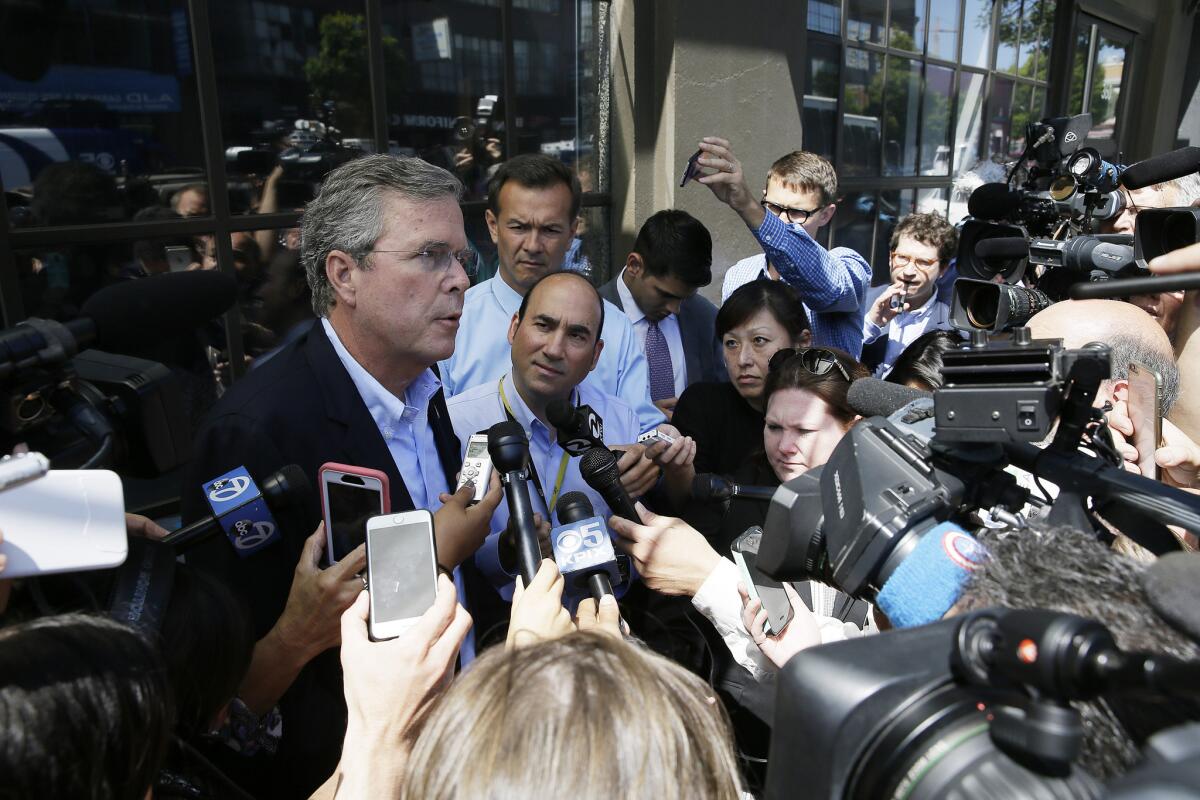Op-Ed: No to the Iran deal means no to U.S. credibility

Republican presidential candidate Jeb Bush speaks to reporters in San Francisco in July. A number of GOP candidates have vowed to rescind the agreement with Iran, some on their first day in office.
A striking feature of the debate raging among American politicians over the Iran nuclear agreement is the virtual absence of references to international law. Republican presidential candidates compete as to who among them, if elected president, would be quickest to renounce the agreement, as if the United States were utterly free to do as it pleases without consequences.
Democrats, including President Obama and Secretary of State John F. Kerry, apparently also take for granted that it is within American power to kill the deal. During his recent grilling by Republican members of the Senate Foreign Relations Committee, Kerry predicted that if Congress passed a resolution against the deal and then overrode a presidential veto, the deal would be dead and Iran would then sprint toward a nuclear bomb, triggering an attack by Israel and igniting a catastrophic new war into which the United States might irresistibly be drawn.
Perhaps this was a case of fighting overheated rhetoric with equally overheated rhetoric, but it seems legally, logically and politically wrong. Neither a congressional resolution of disapproval nor a veto override will, or can, kill the deal.
The Joint Comprehensive Plan of Action signed in Vienna on July 14 is not a bilateral agreement between Iran and the United States. It is a multilateral agreement signed by seven countries (China, France, Germany, Iran, Russia, Britain and the United States). Its merits being clear, it was subsequently endorsed by a unanimous resolution of the U.N. Security Council, and only one of the U.N.ŌĆÖs 193 member states ŌĆö Israel ŌĆö is publicly opposed to it.
This multilateral executive agreement signed by the United States is not a treaty; it does not require Senate ratification to be binding on the United States. Still, Congress could cause the United States to breach its obligations under the agreement by not releasing Iranian funds held in U.S.-controlled banks and by not lifting unilateral American sanctions against Iran.
However, this would not nullify the deal for other signatories. It would simply constitute a decision to opt out and not participate in the agreement, reminiscent of earlier American opt-outs from the League of Nations and the International Criminal Court. The other signatories would be perfectly free to honor the Iran deal and would be far more likely to do so than to follow the U.S. example.
After all, why should any other country (with the possible exceptions of Australia, Canada, the Marshall Islands, Micronesia, Nauru and Palau, the only countries that habitually join the United States in supporting Israel at the U.N.) be inspired to breach the agreement or ignore the U.N. Security CouncilŌĆÖs resolution simply because the U.S. Congress has expressed its disapproval?
The United States may take a cavalier, if not willfully ignorant, stance toward its legal obligations, but other countries take international law seriously. They also recognize that the Iran deal dramatically reduces the risks of a catastrophic war involving Iran and Israel. There is no reason to doubt that all its other signatories would respect the agreement even if the United States opted out.
This is especially true of Iran, which, according to the unanimous view of all 16 U.S. intelligence services, has not had a military nuclear program since 2003. Any breach by Iran would immediately reverse the sanctions relief that it has for so long struggled and negotiated to achieve. If Iran were to sprint toward a nuclear bomb, it would surely invite attack by nuclear-armed Israel.
Iran has every incentive to uphold the deal and, by doing so, reap the benefits of its reintegration in the global community and the world economy. An American opt-out would only serve to isolate the U.S. and prove to the world that its word cannot be trusted. The U.S. may take its legal obligations lightly, but when it breaches them, others will take note, with untold long-term consequences.
Since World War II, American leaders have felt a right and an obligation to lead the world. Were the United States to isolate itself over the Iran nuclear deal, it would not risk imminent war but, rather, grave damage to its credibility and potential for future world leadership.
Such a self-humiliating folly can be avoided. It remains to be seen whether Congress will have the wisdom and genuine patriotism necessary to avoid it.
George Bisharat, a professor emeritus at the University of CaliforniaŌĆÖs Hastings College of the Law, and John V. Whitbeck, a Paris-based international lawyer, write frequently on the Middle East.
Follow the Opinion section on Twitter @latimesopinion and Facebook
More to Read
A cure for the common opinion
Get thought-provoking perspectives with our weekly newsletter.
You may occasionally receive promotional content from the Los Angeles Times.










